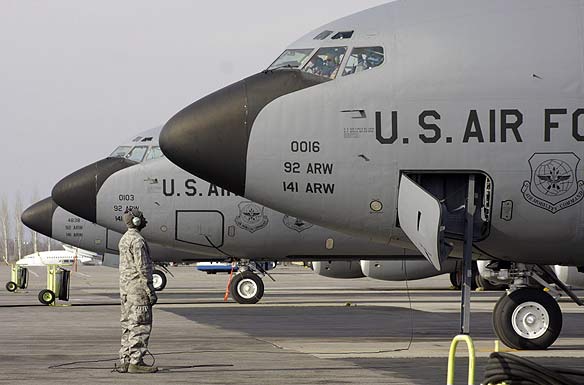
Kyrgyz Politicians Hope US DoD will Overturn its Decision
Publication: Eurasia Daily Monitor Volume: 7 Issue: 205
By:

Kyrgyzstan’s political leaders were surprised by the US Department of Defense’s (DoD) decision to renew its contract with the London-based and Gibraltar-registered Mina Corp Inc., the contractor that has been responsible in recent years for supplying jet fuel to the US Transit Center in Manas. The one-year, $315 million contract will allow Mina Corp to supply 96 million gallons of fuel to “Manas,” with a possible extension of the contract for another year, represents 80 percent of the total fuel supply needs at Manas.
Kyrgyz President, Roza Otunbayeva, has expressed her frustration with the DoD decision, particularly because the contract with Mina Corp was renewed while her government is still investigating the company’s business deals in the country. According to the president, the Pentagon has turned a blind eye to the fact that revenues from selling fuel to Mina Corp by local companies surpass the state budget. The business is so secretive, she alleges, that it is difficult to trace how these virtual companies serving Mina Corp function (www.akipress.kg, November 8).
Both DoD and Mina Corp, however, have claimed that they are not aware of any corruption schemes led by Kyrgyz contractors. The US Congress, meanwhile, has called on the DoD to ensure transparency in its fuel supply contracts. Kyrgyzstan’s own investigation into Mina Corp and its affiliate company Red Star is currently in progress.
Vice-President, Azimbek Beknazarov, said he is hopeful that the US government will “change its mind” and cancel cooperation with the existing contractors. “The investigation is about to be completed. I cannot reveal some of its findings, but am convinced we have documents demonstrating these companies [wrongdoings]. I am sure that after the US government sees these documents, it will consider the re-bid invalid and will announce a new tender,” Beknazarov explained (www.ca-news.org, November 9). According to Beknazarov, the sons of two ousted presidents –Askar Akayev and Kurmanbek Bakiyev– did business with Mina Corp and had constructed elaborate corruption schemes around fuel supplies to “Manas.”
Entangled in a myriad of political issues, including post-violence reconciliation in southern Kyrgyzstan and holding parliamentary elections, the Kyrgyz government has to date been unable to show enough evidence of how the corruption schemes were maintained among local contractors. But that jet fuel contracts between external firms and local providers were marred by corruption is common knowledge in Kyrgyzstan. The notion that “Manas” had been a lucrative source of revenue for the Akayev and Bakiyev regimes was among important arguments for the mobilization of opposition to these leaders in 2005 and 2010.
Public opinion vis-à-vis the Transit Center dramatically changed in 2006, after a US soldier shot dead a local truck driver. The US Embassy in Bishkek issued only an online statement in response to the incident, while the Russian-language media exploited the case to prove that the Western presence is potentially dangerous. Reports arguing that the airbase is used for drug-trafficking permeated the media. Reporters from then popular Bely Parakhod newspaper even speculated that the airbase hosted nuclear warheads to attack Iran.
Although none of these reports were supported by credible evidence, since 2006 any political announcement to withdraw the US airbase found ardent support in Kyrgyzstan. While it is ultimately the responsibility of the current government to prevent corruption among local contractors, the Pentagon’s collaboration with Mina Corp makes it even easier for anti-US political forces to raise the issue of the Transit Center’s status in the country. That the US is turning a blind eye to corruption in Kyrgyzstan –will once again become the argument of such forces, including among the political parties represented in the parliament.
The status of the US Transit Center has been a particularly sensitive issue for the new government since the April 7 regime change. Informally, members of the new government blame Washington for indirectly supporting the former regime despite its numerous violations of human rights. Political leaders from the Ata-Meken party, the only openly pro-Western force, have been especially dissatisfied with the degree of support shown by the United States toward the Bakiyev government.
However, partly because the ousted president Bakieyv’s family transferred $170 million to offshore accounts through Aziauniversalbank on the night of April 7 and the overall dire economic situation in the country, the Transit Center is regarded more as a source of state revenue rather than as a foreign policy preference.
The resumption of cooperation between the US Department of Defense and Mina Corp comes at a time when the Otunbayeva administration is pushing for greater transparency throughout the government. Some positive changes are noticeable: Otunbayeva has been determined to fight the major sources of corruption in the previous regime (www.ca-news.org, November 8). The president has also announced that a new state agency “Manas” will be formed to take over fuel supplies to the Transit Center. The Kyrgyz government is also pushing for the gradual increase of fuel supplies by local companies, hoping to boost their involvement from 20 percent to 50 percent during 2011.




